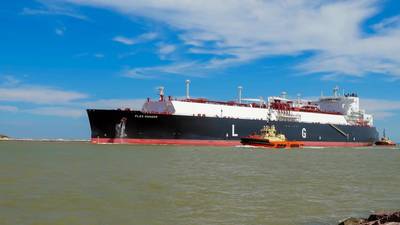US Approves More Exports from Major LNG Terminals
The Biden administration said on Wednesday it had authorized additional exports of liquefied natural gas from two major facilities on the U.S. Gulf Coast, in a move that could help Europe deal with an energy crunch worsened by Russia's invasion of Ukraine.
The Department of Energy (DOE) issued approvals allowing major supplier Cheniere Energy to export the equivalent of 0.72 billion cubic feet per day (bcfpd) of the supercooled fuel from its Sabine Pass, Louisiana and Corpus Christi, Texas, terminals to countries that do not have free trade agreements with the United States including all of Europe.
Previously the terminals were authorized to export the gas only to countries with free trade agreements - including Canada, Mexico, Australia, and more than a dozen others in Asia, the Middle East, Central and South America - or other destinations including China.
The authorizations mean every operating U.S. LNG export project now has approval to export its full capacity to any country where not prohibited by U.S. law or policy, the DOE said in a press release.
"U.S. LNG remains an important component to global energy security, and DOE remains committed to finding ways to help our allies and trading partners with the energy supplies they need while continuing to work to mitigate the impact of climate change," the DOE said.
Before Russia's Feb. 24 Ukraine invasion, the United States had talked with LNG exporting countries and companies about contingency plans to keep the fuel flowing to Europe. Russia usually provides around 30% to 40% of Europe's gas, which totaled about 18 bcfd in 2021.
"This authorization will allow for additional operational flexibility for us and our customers during this pivotal time and for decades to come," Cheniere said in an e-mailed statement.
U.S. lawmakers and energy industry trade groups had been calling on the Biden administration to ramp up natural gas and oil exports to allies as Europe faces an energy crunch exacerbated by Russia's invasion of Ukraine.
White House efforts to boost U.S. LNG exports were proceeding slowly, however, because of concerns about the impact on climate change of projects that could last decades, government and industry sources said last week.
The DOE said U.S. LNG is an important component of global energy security, and with an expected rise in exports, it is "particularly focused on driving down methane emissions in the oil and gas sector both domestically and abroad."
The United States is now the top global exporter of LNG and is expected to export an additional 20% beyond current levels by the end of this year as more capacity comes online.
(Reuters - Reporting by Timothy Gardner and Valerie Volcovici; Editing by Tim Ahmann, David Gregorio and Richard Pullin)


















